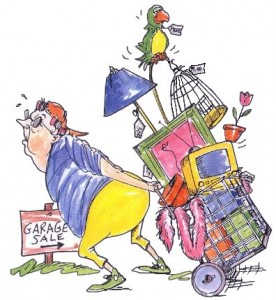The start of another school year is just around the corner which means that it’s time for consignment sales in many areas! I completed my first consignment sale in April and made almost $400. It’s a great way to get rid of items that are just sitting around your house and it’s much less hassle than a garage sale (in my opinion at least). I will be participating in another sale again soon!
How does it work?
You gather up your clothing, toys, and other household items that you want to sell. (PLEASE NOTE: Different consignment sales have different guidelines about what can be sold. Please check in your area to find out what is acceptable. Most of the sales in my area are looking for children’s clothing, maternity clothing, and toys.) You typically have to pay a “fee” to register at the consignment sale (typically this is about $10 in my area, but this fee may vary by area). You are responsible for pricing your own items and typically, it’s wise to price items at 1/3 to 1/2 of what you paid for them. Many consignment sales now have an online system for logging your items and printing your tickets.
On the designated day and time, you will drop off your items to be sold and typically sign a waiver. You will return to pick up your un-sold items on the designated day and time after the sale is over. A few weeks after the sale, you will receive a check with your profits. Your profit is typically 60-80% of the price you listed the items at. If you volunteer at the sale, you will sometimes receive a greater profit.
Tips for Success
1. Start pricing early! You don’t want to wait until the last minute.
2. Make sure clothing is in good condition (free from stains, holes, etc.). If you wouldn’t let your child wear it anymore, no one else wants their child to wear it, either! If items are wrinkled from storage, you may want to iron them just to improve the appearance.
3. Group items together and sell them as an outfit. From my experience, outfits sell better than single items!
4. Price to sell. If your goal is to get rid of items and your prices are too high, they will not sell. Depending on the brand and quality of the item, pricing between 1/3 to 1/2 of the original purchase price is a good rule of thumb. I was able to sell Gymboree and Gap items for more than items from Old Navy or Target. Also, many sales will give you the option of listing items at half price on the last day.
5. Donate what’s left to a charitable organization. Some sales will even take care of this for you. Make sure you get a receipt so that you can deduct your donation on your taxes.
If you’re in the Houston area, there are three consignment sales that take place every 6 months:
Just Between Friends Houston – late October sale date anticipated (see website for more information)
*This post may contain affiliate links. Please refer to my disclosure policy for more information








